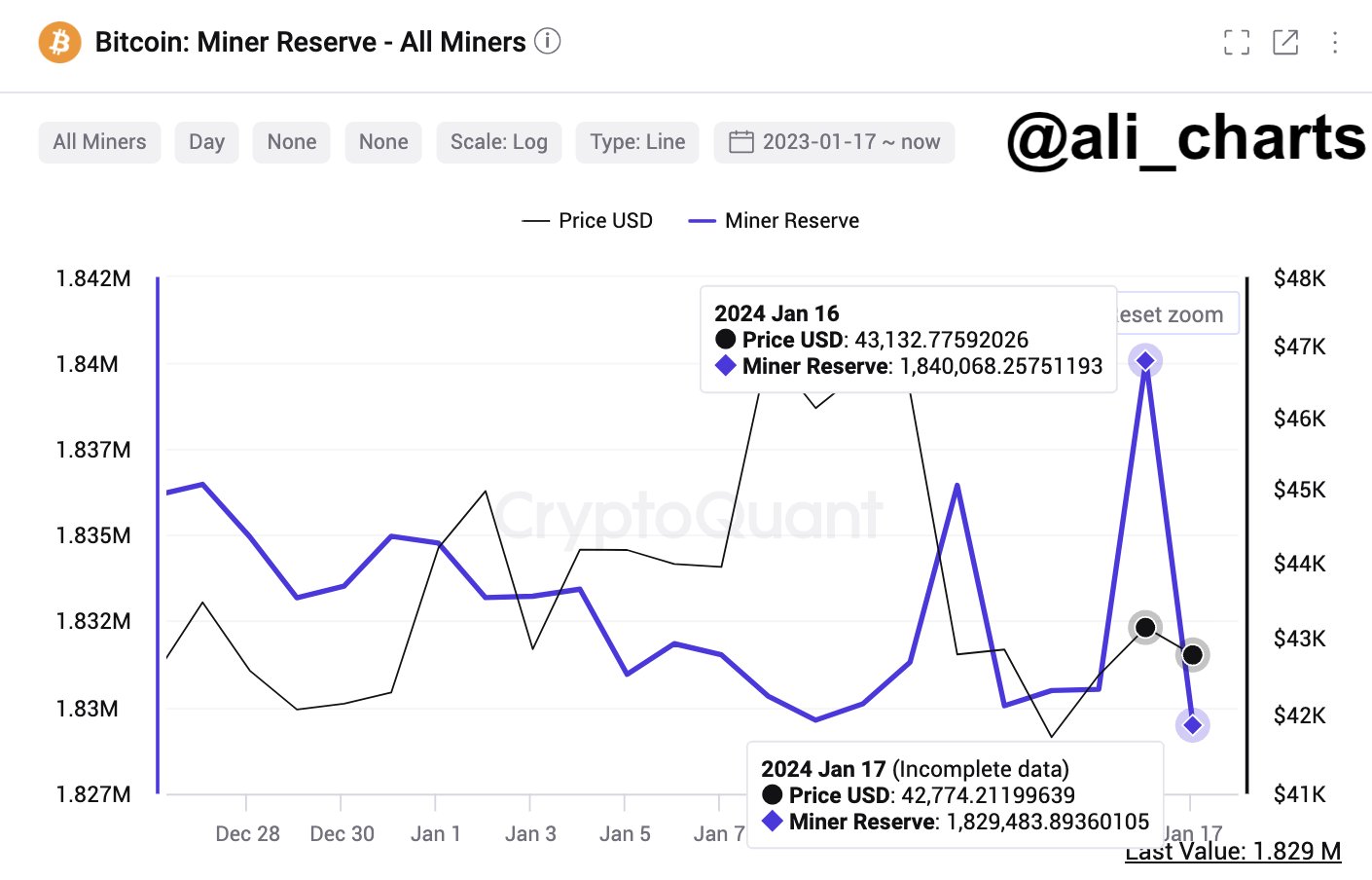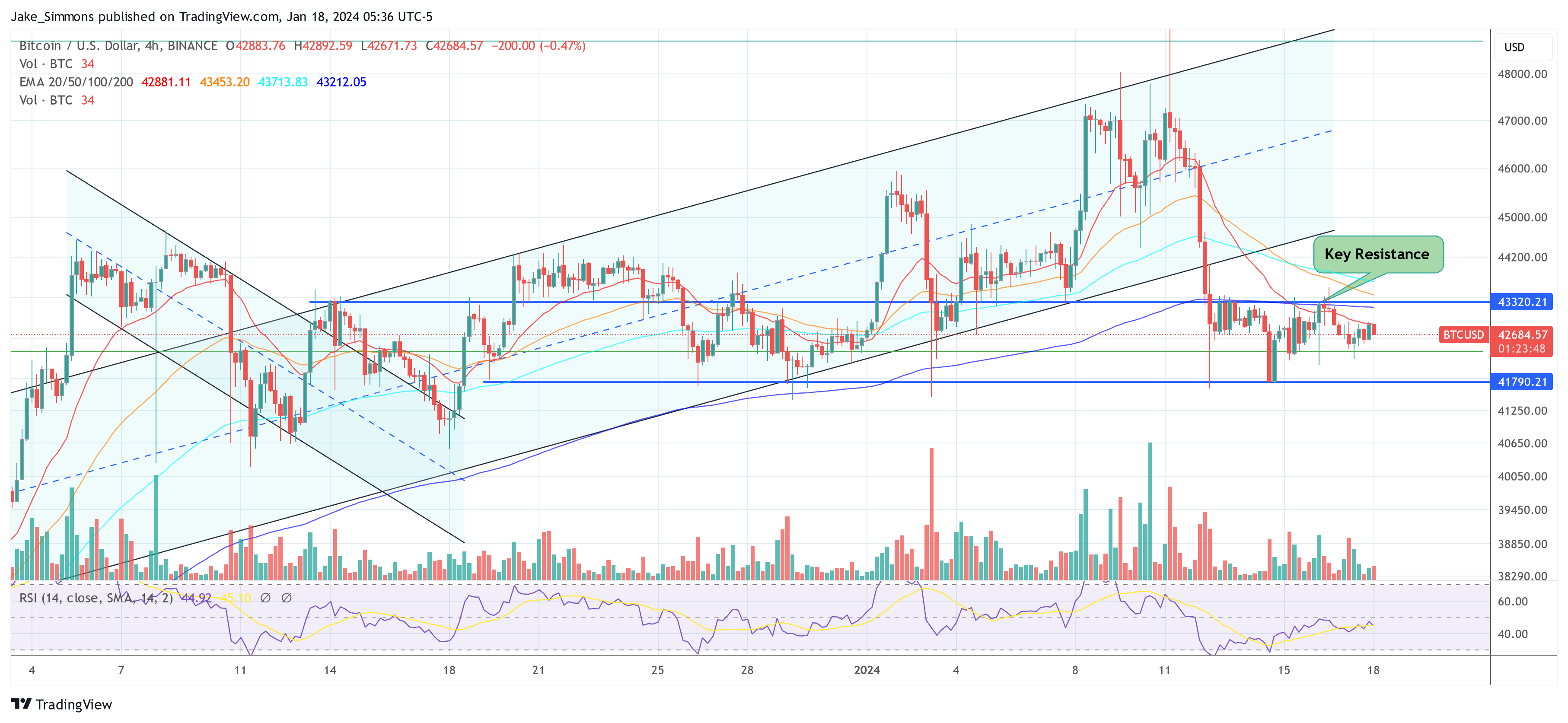
The Bitcoin price has been experiencing a phase of stagnation over the past days, leaving investors and analysts searching for the underlying causes. Three key factors can be seen as central to explaining Bitcoin’s current sideways trading trend:
#1 ETF Inflows Are Offset By GBTC Selling, But For How Much Longer?
The spot Bitcoin ETFs continue to be the dominant theme on the market, and Grayscale in particular, with its GBTC, remains the focus of analysts. While the ETF inflows continue to be record-breaking, the Bitcoin price remains flat. One of the main reasons for this is presumably the outflows on GBTC, which is viewed as overpriced with its fee of 1.5% per year (compared to 0.25%) by other issuers.
Thomas Fahrer of Apollo pointed out the significant flow discrepancies in the market: “In three days of trading. IBIT +16K BTC, FBTC +12K BTC, BITB +6.7K BTC, ARKB +5.3K BTC, GBTC -27K BTC. GBTC BTC is flowing but not enough to sustain the other ETFs. Supply shock inbound imo.”
Alessandro Ottaviani provided further insights, stating, “Bitcoin inflow in the ETFs: +47k, Bitcoin outflow from Grayscale: -27k, net inflow: 20k. […] Soon or later I expect Grayscale outflow stopping or reducing significantly. Those who have Grayscale GBTC were already into Bitcoin and therefore I think they already made the decision to sell, the execution of which should happen not so much later than the launch of the ETF.
Bloomberg analysts James Seyffart and Eric Balchunas expect a portion of GBTC outflows to migrate to other Bitcoin exposures, highlighting the complexities of fund accounting and settlement delays in tracking these movements. They noted, “GBTC has crossed $1.1 billion in outflows…We expect a meaningful percentage of those assets to find their way back into Bitcoin exposure, mostly other ETFs.”
#2 Bitcoin Miners Sell
Ali Martinez has spotlighted the intensified selling activity by Bitcoin miners as another factor influencing the current price stagnation. Recent on-chain data indicates that miners have significantly increased their Bitcoin sales.
Martinez commented on X (formerly Twitter), “Bitcoin Miners in Selling Mode: Recent on-chain data from Cryptoquant indicates a substantial increase in selling activity by BTC miners.”
Notably, the shift in miner behavior is consistent with historical trends, where miners sell their holdings to manage cash flow or capitalize on price increases during market rallies.
#3 Consolidation Phase Following ETF Mania
The market is currently undergoing a consolidation phase after the euphoria surrounding Bitcoin ETFs, which led to an 82% rally. Such a phase is considered natural and mirrors historical patterns seen in other markets, like the first gold ETF.
Although gold initially recorded an increase of around 6%, it then took a full nine months to start the actual rally, which almost quintupled the price. The same goes for the Bitcoin ETFs. It will take some time before the marketing machine of the asset managers starts up and new institutional investors can be convinced of the new asset class.
Analyst Skew provided a technical perspective, stating, “BTC 4H: Remaining flexible till trend confirmations, however not looking good for the bulls without 4H 200EMA reclaim & RSI below 50. Yearly open [is] still very important for overall risk-reward. Above is good with bullish confirmations. Below is bad for risk & with bearish confirmations leads to downtrend (hedge mode). Pivotal area for 1H – 4H trend ~ $42.5K”
At press time, BTC traded at $42,684.

Featured image created with DALL·E, chart from TradingView.com
Disclaimer: The article is provided for educational purposes only. It does not represent the opinions of NewsBTC on whether to buy, sell or hold any investments and naturally investing carries risks. You are advised to conduct your own research before making any investment decisions. Use information provided on this website entirely at your own risk.

Leave a Reply